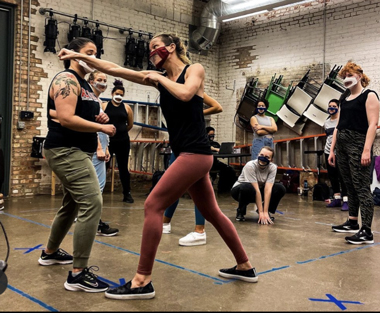
Once the fashion for Juliets, Rosalinds and Lady Macbeths played by actual women became the norm, certain male-identifying characters—Puck, Ariel and Peter Pan, to name a few—also regularly featured female actors in what were called "trouser roles." Whether this practice was grounded in boy-soprano opera or the gender-fluidity traditionally attributed to mythic creatures (e.g. angels or fairies), audiences have proved amenable to gamines of Artemisian appearance assisting in protection of the innocent.
What if the treble voice in the choir belongs to the villain, though? Not just any villain, either, but arguably Shakespeare's baddest of bad-asses, Richard the Third? Are we ready to accept the visual dissonance of somebody who looks like a MOM coolly scheming to murder his own nephews, who forces his attentions on a widow at her husband's funeral and who destroys his adversaries through remorseless exercise of power?
"I'm thinking we've seen enough cross-gender casting by now to become desensitized to it—in a good way," says Cameron Feagin, currently starring in Promethean Theater Ensemble's production of Richard III. While storefront-circuit spectators most likely recall Feagin playing John F. Kennedy in City Lit's recent all-female staging of the docudrama Thirteen Days, she herself cites the 2012 Donmar Warehouse Julius Caesar as the source of the revived interest in separation of actor and role.
"Gender doesn't need to get in the way of telling the story." Feagin observes, "Richard has a lot of what we think of as male toxicity, and so I pretend to be a man, and he remains a man in our production."
Given our culture's Marianistic—some would also say "sexist"—definitions of "feminine" behavior, isn't there some risk in not making Richard more sympathetic, if only grudgingly?
"Like all actors, I sometimes imagine audiences coming after me with pitchforks for not being good enough," sighs Feagin, "but never for being a woman playing a man. So many of the great roles in Classical Theatre were written by men, for men. If we eliminate gender as an issue, however, we can open up theater and the other arts to more equitable practices. I say let's do it and let the rest of the world adjust. It WILL adjust."
If gender barriers can be overcome, albeit slowly, how then, does the dynamic change when the bully vilified as a "hump-backed toad" and a "bottled spider" is portrayed by an actor displaying real-life disability? Can audiences in 2022, in their zeal to atone for past injustices by extending unconditional amnesty to a segment of society they now declare to be above responsibility, bring themselves to accept a sociopathic monster being held accountable for immoral actions?
Director Richard Costes rejects such polarized assessments. In his view, a play exists within three time periods: the age in which it is written, the age in which it is set, and the age in which it is viewed. By retaining the genders Shakespeare's deliberately biased portrait of Richard Plantagenet assigns the characters, Costes proposes, the misogyny lurking beneath the text becomes amplified, so that modern audiences, horrified at the abuse inflicted on the women within Richard's purview, can applaud the crafty Elizabeth of York setting in motion the events that will lead to Richard's downfall.
In similar manner, says Costes, the upcoming production sponsored jointly by the Babes With Blades and the University of Illinois Chicago Disability Cultural Center, "embraces Shakespeare's 'coding' of disability as a mark of villainy" through casting disabled actors Aszkara Gilchrist as Richard and Lauren Paige as Elizabeth. "A non-disabled actor 'cripping up' is treating disability as a costume. This erases the unique understanding of the obstacles, both external and internalized, that a disabled King Richard would face—but that a disabled actor [sharing those experiences] could bring to the role." He cites the recent Royal Shakespeare Company production starring Arthur Hughes as Richard. In an interview, Hughes (who has radial dysplasia) explained, "When I walk out on stage, it's immediately apparent that I have a disability. I can't hide it. There's a truth to it right away, before I've even opened my mouth."
Casting alone is not enough, Costes reminds us. "Shakespeare wrote his play as propaganda, but disability as a means of 'othering' evil is still prevalent today. In 2022, we are morally obligated to battle outdated stereotypes."
Promethean Theater Ensemble's Richard III will run at the Factory Theatre though June 25
The Babes With Blades Richard III will run at the Edge Theatre from August 25-October 15
Mary Shen Barnidge
Contributing Writer

 Follow Us On Twitter
Follow Us On Twitter